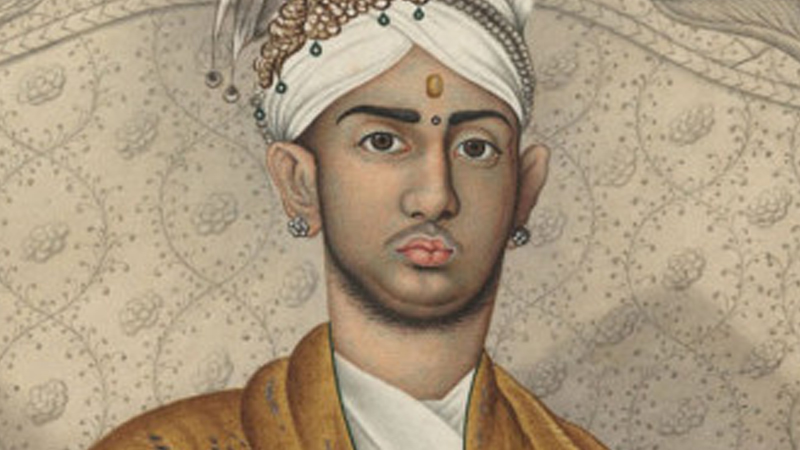Biography of Tyagaraja

Thyagaraja was a famous musician. He was a great knower of 'Carnatic music' and a poet of devotional path. He composed devotional songs dedicated to Lord Shriram. His best songs are often sung at religious events. Thyagaraja had enriched society and literature as well as art. His erudition is reflected in his every work, although the work 'Pancharatna' is said to be his best work. No moment of Thyagaraja's life was separated from Shriram. In his works, he described Lord Rama as a friend, master, father and helper.
Born on May 4, 1767 in Thiruvarur, Thanjavur district, Thyagaraja's mother's name was Sitamma and his father's name was Rambrahmam. He says in one of his works - "Sitamma Mayamma Shri Ramudu Ma Tandri" (Sita is my mother and Shri Ram is my father). Perhaps through his song he wants to say two things. On the one hand, they tell about the real parents, on the other hand, they show their faith in Lord Rama. Born and raised in a well cultured family, Thyagaraja was a great scholar and poet. He was a connoisseur of Sanskrit astrology and his mother tongue Telugu.
For Thyagaraja, music was a way of meeting God and devotion has especially emerged in his music. His passion for music was from his childhood. At an early age he became a disciple of Venkataramanaya and in his adolescence he composed the first song 'Namo Namo Raghav'.
The compositions of Thyagaraja, who made an effective contribution to the development of South Indian classical music, are still very popular today and they are sung a lot in religious events and programs organized in honor of Thyagaraja. Thyagaraja along with Muttuswami Dixit and Shyamashastri gave a new direction to Carnatic music and in view of their contribution they were termed as Trimurti.
Their attachment to music
Thyagaraja's passion for music dates back to his childhood. At an early age, he became a disciple of Sonti Venkataramanaiya, a highly regarded music scholar of the time. During his formal music education, he did not attach much importance to the technical aspects of classical music and focused on spiritual facts. The purpose of their songs was purely religious and cultural. As a teenager, he composed his first song, Namo Namo Raghav.
A few years later, when he received formal music education from his guru, he was again called upon by Sonti Venkataramanaiya to perform music. In this ceremony, he enchanted his guru with his musical performance, which pleased him and invited Thyagaraja to act as a court poet and musician on behalf of the king. But this proposal was rejected by Thyagaraja.
Tyagaraja's compositions, which effectively contributed to the development of South Indian classical music, are still very popular today. Even today, they are sung a lot in religious events and programs organized in honor of Thyagaraja. Thyagaraja along with Muttuswami Dixit and Shyama Shastri gave a new direction to Carnatic music. In view of the contribution of these three, they have been adorned with the nickname of 'Trimurti' in South India.
Travel to South India
Thanjavur king Thyagaraja was very impressed by the talent. He also invited Thyagaraja to join the court. But Thyagaraja, immersed in the worship of the Lord, rejected his attractive offer. He rejected the king's proposal and composed the famous work "Nidhi Chal Sukham" i.e. "Can wealth bring happiness". It is also said that Tyagaraja's brother threw the idol of Shriram, which was worshiped by Tyagaraja etc., into the nearby Kaveri river. Thyagaraja could not bear the separation from his favor and had to leave the house.
Masterpieces
Apart from composing about 600 works, Thyagaraja also wrote two plays in Telugu, 'Prahlad Bhakti Vijay' and 'Nauka Charitam'. While 'Prahlad Bhakti Vijay' is a play of 45 works in five scenes, 'Nauka Charitam' is a one-act play and has 21 works. Thyagaraja's erudition is reflected in his every work. However, the work 'Pancharatna' is called his best work. Apart from hundreds of songs, he also composed the festival sects 'Kirtanam' and 'Divyanam Kirtanam'. He also composed songs in Sanskrit. However, most of his songs are in Telugu.
Samadhi
Everything that Thyagaraja has created is at its best. There is also a flow in it, which attracts music lovers. Spiritually Thyagaraja was among those who did not care about anything in the face of devotion. In his works, he described Shriram as a friend, owner, father and helper. On January 6, 1847, Thyagaraja was buried.
लेख के प्रकार
- Log in to post comments
- 487 views
